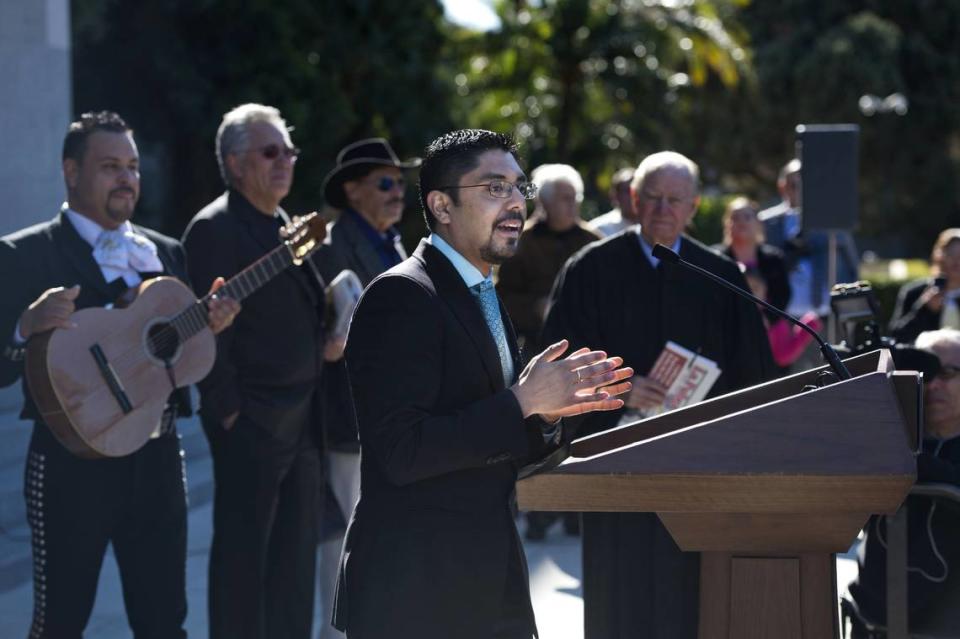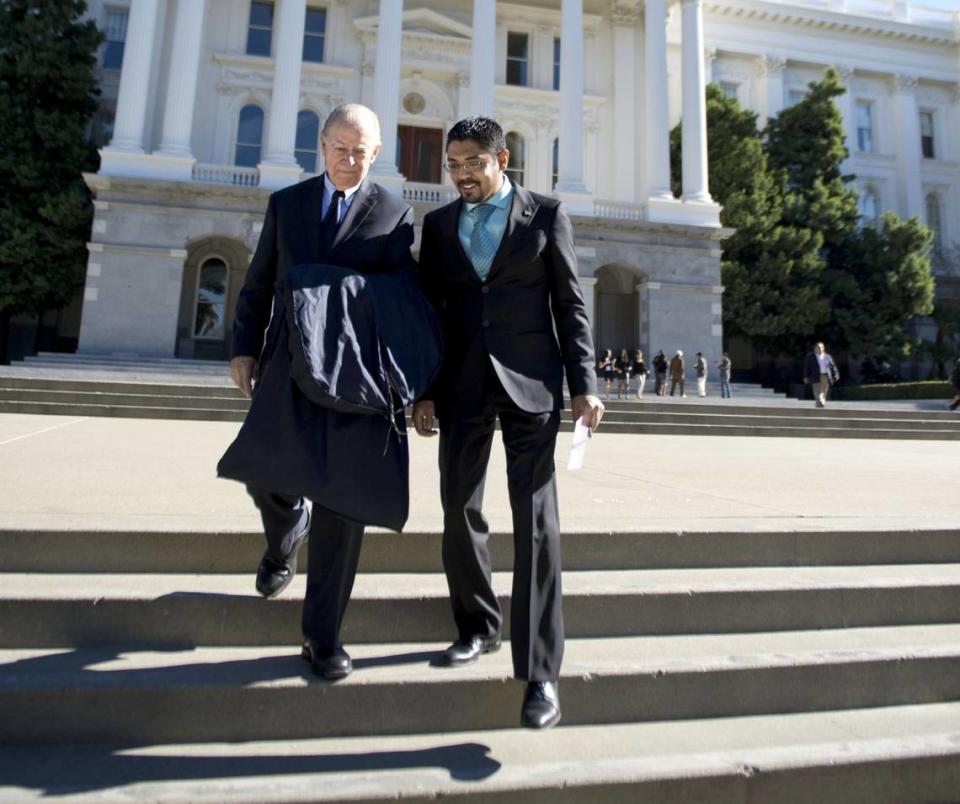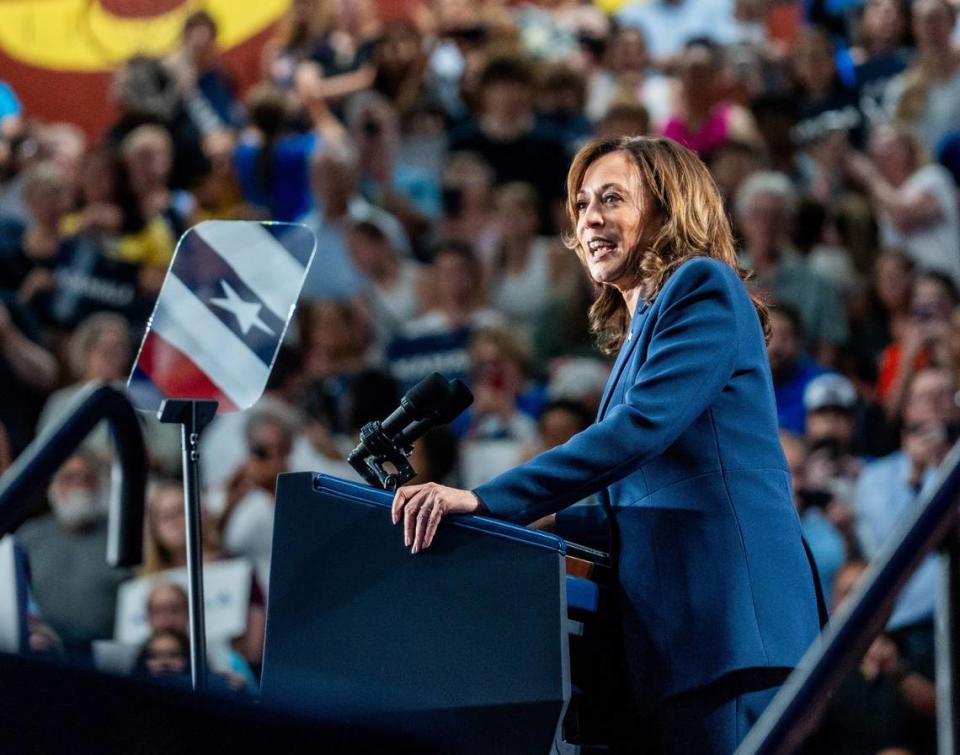How Kamala Harris helped a California man become the nation’s first undocumented lawyer
For most of his life, Sergio Covarrubias Garcia tried his best to avoid interactions with law enforcement.
As a 17–year–old, Garcia prayed police wouldn’t stop the Chevy truck used to smuggle him and other undocumented men across the border. His nerves only continued. Garcia longed for officers to look away each time he drove to work or school.
Despite his efforts, Garcia attracted the attention of California’s top law enforcement officer — then-Attorney General and now-presidential candidate Kamala Harris — in 2012. At the time, Garcia was enduring a yearslong and publicized struggle to become the first licensed undocumented attorney in the nation.
To Garcia’s surprise, Harris came out in support. She went on to submit a written brief backing his legal case and even provided a lawyer from her office to argue for him in front of the state Supreme Court.
“To know that the ‘top cop’ in California did not hate me for being undocumented, and was supporting me and wanting me to achieve my dream,” Garcia, 47, said. “That was huge.”
Vice president Harris’ endorsement “made the difference” in the case and eventually led to a unanimous California Supreme Court decision in Garcia’s favor, according to Kevin Johnson, dean of UC Davis’ law school and one of the attorneys who represented the State Bar of California for Garcia.
Support had varied immensely for Garcia. While the state bar, civil rights groups and Latino lawmakers argued for his cause, the Barack Obama administration opposed it.
“When the highest law enforcement officer of a state weighs in and says this is legal, this is permissible, this is possible, the Supreme Court of the State of California listens,” Johnson said. “She could have ducked and covered and tried to avoid any political controversy. But she sided with the State Bar of California and Sergio Garcia, so, I respect her for that.”
Harris’ stance is particularly noteworthy amid renewed disapproval over her immigration record in the White House and prior views on the issue. Back then, Johnson said, support for the undocumented community wasn’t so widespread, even in California.
Harris has faced scrutiny on immigration from across the political spectrum. Republicans routinely blast her as the Biden administration’s “border czar,” while some Democrats have expressed disappointment that Harris hasn’t been a stronger defender of immigrants.
Her past championing of Garcia will likely only further the criticism, Johnson said.
“I’m ambivalent about the news getting out there, but I think it was a relatively courageous thing for her to do, to be out there in support of the rights of the undocumented,” Johnson said.
The vice president’s office and campaign did not respond to requests for comment on this story.
‘Harris took some risks’
Garcia was born in the western Mexican state of Michoacán and brought to the United States by his parents when he was 17 months old. He traveled back and forth between the two countries until he permanently moved to Northern California at 17.
Over the next 15 years, he worked in the almond fields, at a grocery store, received two degrees at community college and earned a paralegal certificate at California State University, Chico. All the while, he moved closer to achieving his childhood dream of becoming an attorney.
He’d go on to graduate from law school to pass the bar exam on the first try in 2009. But the state bar, which licenses attorneys in the state — and later the California Supreme Court — would block Garcia’s license.
The case went on for years, with the U.S. Department of Justice, under Obama, arguing that a 1996 law was “plainly designed to preclude undocumented aliens from receiving commercial and professional licenses issued by states and the federal government.”
Harris, disagreeing with the Justice Department, submitted an amicus brief that said a license for Garcia would comply with state and federal policies that “encourage immigrants, both documented and undocumented, to contribute to society.”
“It is not a crime either to be present or to work in the United States without immigration status, and Garcia has never been charged with the crime of unlawful entry,” Harris’ office wrote. “In fact, Garcia has been forthright about his immigration status with federal officials and has been approved for a visa when one becomes available.”
Harris also provided a lawyer from her office to attend Garcia’s hearings before the state Supreme Court.
“This wasn’t a slam dunk, and Attorney General Harris took some risks in standing up to the federal government and staking out California’s position,” Johnson said.
Her support stood out given the Obama administration’s opposition, said Garcia while fighting back tears in a conversation last week. He called it an “immense morale” boost.
“There was absolutely nothing she could gain from supporting me and a lot to lose,” Garcia said.
His case inspired the passage of a new state law which allows immigrants without legal status to apply for professional licenses in the state. In 2014, the California Supreme Court ruled unanimously that the law allowed Garcia to be admitted to the state bar and practice law.
‘Kamala has a lot of work to do’
Nearly two years after Harris voiced her support for Garcia, she invited him to her office.
Garcia, now a regarded lawyer living in Chico, California, recalled his nervousness on that February 2014 day. Even then, he still had reservations about law enforcement.
“It’s a little unnerving when the ‘top cop’ calls you to their office,” Garcia said.
The two talked for more than an hour, despite one of Harris’ staff members telling Garcia that he was only granted 30 minutes and “not to waste her time.” Garcia said Harris later playfully scolded him for repeatedly looking at his watch during the conversation. She reminded me “who the boss was,” he added.
Harris ended the conversation by providing him with a medal of valor.
“I definitely wasn’t nervous after talking to her anymore,” Garcia said. “I was actually happy and excited and couldn’t even believe how fortunate I was to have the support of somebody like her.”
Today, Garcia is fully backing Harris on her campaign to become the first female president of the United States. Still, he doesn’t hide his disappointment with her and President Joe Biden over what he calls a lack of effort for the Latino community and immigration reform during the last few years.
“In that respect, I would say Kamala has a lot of work to do,” Garcia said.
If Harris wins the presidency, Garcia wants her to “shine for the immigrant community.” He wants her to push for immigration reform for the roughly 11 million undocumented immigrants, who have lived in the U.S. for decades.
“I hope if she gets to become president that she gets to show to the rest of the country, and especially the rest of the Latino community, the person that she showed me,” Garcia said.



